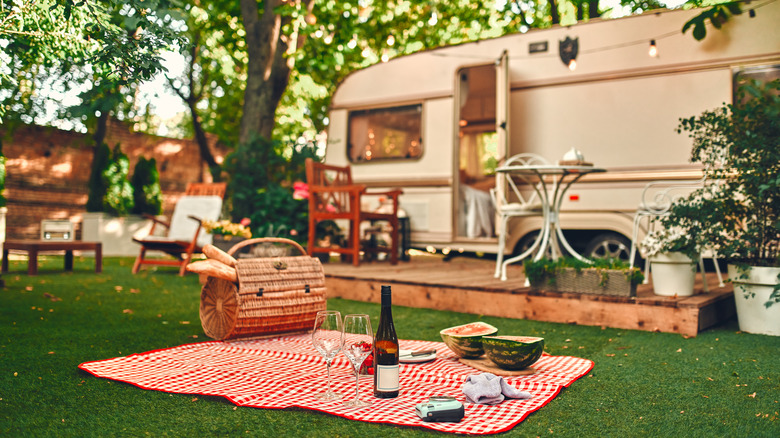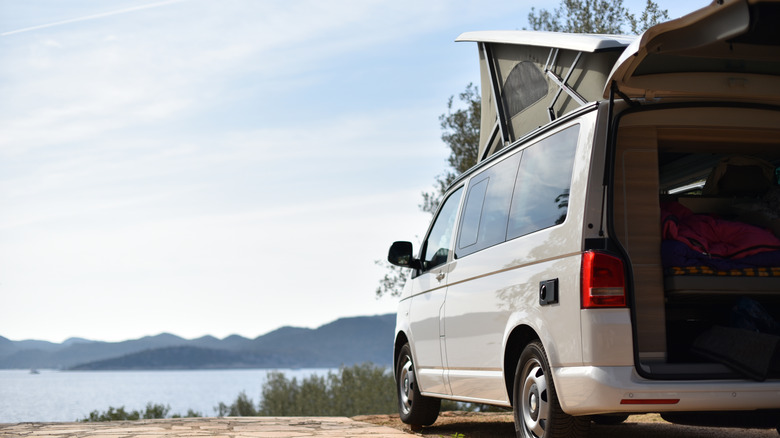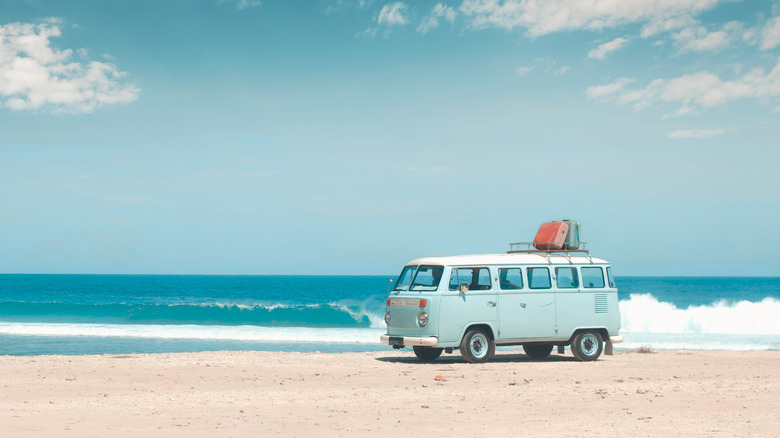How Much Does It Cost To Convert A Van Into A Tiny Home
Many people have changed their understanding of vacation time during the coronavirus pandemic. Shuttered hotels, minimized airline schedules, and the closing down of major attractions in tourist destinations all over the world have pushed homeowners and consumers of all types to look elsewhere for great vacation options that can offer up a much-needed change of pace. One popular option is converting a van into a mobile tiny home.
Realtor.com estimates a wide berth for the overall cost of a van conversion, ranging from around $20,000 for the van, plus a few thousand to conduct the living necessity installations, to more than $130,000 for a fully decked-out build that can support lengthy stays out on the open road.
Alternatively, Parked in Paradise suggests that some people seeking a taste of the van life opt to purchase a Mercedes Sprinter Van — one of the most notable high-walled vans seen on the road today — and go all out on the renovation aspects. However, the truth is that an older model can serve the nomadic spirit you're trying to cultivate perfectly, and for a much cheaper price tag of around $10,000.
The choice of van and inclusions is completely your own, so thinking through the kinds of creature comforts and renovations that will support your desires and budget is the best way to make the most of this home addition.
Factors for cost
A tiny home van that is both roadworthy and capable of supporting your sleeping, eating, and relaxation needs can be achieved for a bargain price point, or one that's designed around a life of luxury. One thing that sets this lifestyle addition apart from essentially any other — including a larger RV or tour bus-type vehicle — is the ease of storage. A van is essentially a slightly larger-than-average car, meaning it can often be housed in a driveway or in the garage while not in use.
The Vanual reports that a van conversion project gives you access to lot parking just like a traditional car driver would enjoy. This means that you can eliminate this expense from much of your planning when it comes to both storage and the travel that you'll be doing in the vehicle; although, parking at a campground that charges will typically cost you between $25 and $80 per night, according to Camper Report. These fees can vary depending on the included services, the size of the rented campground space, and the specific state and local park areas.
The van itself accounts for much of the price tag
People considering a turn toward what is often termed the van life will first have to decide on the cargo van that will support this new and exciting lifestyle. The first question that you'll need to answer is whether you need a 4x4 or a more standard two-wheel-drive (2WD) model. Sync Vans suggests that a 2WD cargo van will suit most users but cautions against reliance on these vehicles in more extreme weather conditions. Selecting the right type of van and features that will support the lifestyle you are seeking starts before you even consider basic brands and models.
The U.S. Department of Transportation reports that the average long-distance vacation taken by drivers measures out to 314 miles each way. While van owners will often extend this range considerably because of the built-in living features, it's important to note that a conservative estimate clocks a 300-mile trip at around five hours of drive time each way (without including stops). So one great indicator of the kind of built-in features you might need lies in the geography of the place you call home and its surrounding regional landscape. Put simply: A van owner in Alaska will need a much different set of features than one in Florida.
Another consideration to make here is whether you want to purchase a diesel or gasoline-powered vehicle. Bear Foot Theory estimates that diesel vans can reliably handle hundreds of thousands of miles of driving, whereas a gasoline model may not be able to stand up to this same demand. Longevity will play a key role in the cost-effectiveness of any van purchase, so being realistic about your expectations for the vehicle is important when making the right decision for your needs.
Some great options for van conversions are, of course, the Mercedes Sprinter (about $38,300 for a 2022 model, via Edmunds), Ford Transit (a 2022 model averages about $43,420, according to Edmunds), Dodge ProMaster (starting at $34,380, via Kelley Blue Book), and the VW California, which retails for about $55,500, per The Wayward Home.
Basic flooring, walls, insulation, and ventilation are the first changes you'll make to the van
There are many companies out there that specialize in the art of van conversion, and this service will cost anywhere from about $30,000 up to more than $200,000, depending on the level of customization and luxury inclusions that you are hoping to bring to the project (via Muse & Co. Outdoors).
For a DIYer, the task of renovating a van and transforming the basic layout into a space that can support your ambitious travel and adventure plans looms large as an integral component in the overall enjoyment that you will experience from the vessel itself. Likewise, conducting these changes on your own can save you a considerable amount of money, since a professional job can double the total cost to purchase and then outfit the vehicle for your purposes. The first thing that any van owner will have to do is clear out the existing guts of the vehicle. This means removing seating, siding, and any integrated tracks, rails, or other obstructions that alter the shape and dimensions of the interior space.
Once you've completed the prep work, it's time to install the basic structures that will transform the cargo component of the vehicle from van space into room space. Insulation is a must for any van conversion, points out Feral Escape, given the thin, aluminum walls that are standard among these types of vehicles. Regulating heat in any space that you intend to sleep and relax in is crucial to enjoying the space itself — your home makes extensive use of insulation, and so too should your camper van conversion.
After measuring and installing insulation around the shell of the vehicle, DIYers and professionals alike create the framework of a room in this area with structural timber and sheets of plywood. This transforms the rear area of the van and will provide you with a blank template to build in the comforts of home.
Renovations center on utility furniture
Furniture in a van-home conversion must serve multiple functions at the same time. Van to Life suggests using a foldaway bed installation, sofa bed conversion, or even swivel seats for the driver and front passenger area to make complete use of the whole interior. Extra Space recommends using convenient pull-out amenities that can quickly and easily extend the area of your mobile home once parked. A built-in cooking area that can be extended out beyond the open side door, or a deck that pushes back into the space underneath your flooring can maximize living space and give you a more comfortable lifestyle while out on the road with friends or family.
Making use of furniture and other inclusions that can pull double duty is a great way to maximize the comfort that you enjoy and the utility of each included component of your van conversion. Many people opt for bunk beds or sofa bed installations to save on space. Similarly, it's a good idea to think about installing a multi-purpose, table-like surface that will be used to support dining, work, games, and other communal time when not actively traveling.
Water and power installations are essential inclusions for a van that will provide living quarters
Lastly, it's important to remember that modern life largely depends on electricity and running water. Many adventurers that engage in the van life rely on solar power for their electrical needs (via Trucks.com), and a basic setup will run you between $500 and $2,500, according to Hi-Van.
Likewise, a pumped water system is a fairly straightforward installation (via Greg Virgoe), but one that will play an integral role in your overall comfort while on an excursion. Two Roaming Souls estimates that the average camper van will require a water storage tank that ranges from 10 gallons up to about 80 gallons, and this can vary dramatically depending on the number of people and the usage habits of your traveling party.
Both of these amenities will play an important role in cooking, cleaning, and relaxation, so ensuring that you've accounted for your van's power and water needs is crucial.
Additional costs
In addition to the basic framework of renovations and installations that will transform your newly purchased van into the support system that will grant you increased vacation mobility, you'll need to factor in ongoing costs and specialized upgrades that can make your life on the road easier and more enjoyable.
Gasoline provides mobility for your home away from home
Perhaps the most obvious additional cost factor when thinking about a roadworthy home environment is the fuel that will power your planned trip. Gasoline or diesel power is the foundation for van transportation, and planning any vacation that sees you and your family out on the road will require you to estimate and budget for the fuel costs that will come into play.
The U.S. Energy Information Administration provides gasoline pricing charts that span decades, showing a steady uptick in pricing with intense spikes occurring alongside key moments in international trade instability. As of April 2022, EIA reports an average gasoline price (across all grades) of $4.213 per gallon. Statista reports an average price per gallon from March 2022 for diesel fuel at $5.11.
Food and drink factors into your ongoing expenses but can minimize your road trip budget in aggregate
Typical grocery purchases will also play a role in any budgeting you'll do for upcoming road trips. Regardless of your typical spending, it's important to calculate these components of your budget in both percentages and aggregate dollar figures in order to make sense of your overall personal finances. Living on the road, either for a short vacation period or for weeks on end, will likely cost less in terms of grocery spending than in the traditional home setting, but making a comprehensive grocery budget can actually save you a considerable amount of money while traveling.
Money Under 30 reports that restaurants typically charge about 300% more than it costs to make any given dish, and states that the average restaurant meal rings up at about $13 while a home-cooked alternative comes out to around $4. Spending on groceries for most of your meals is a great way to stretch your budget.
Driver-friendly features are a good idea for those who will make extensive use of their tiny home van for lengthy road trips
Another important consideration to make when finalizing a van conversion is the experience of the driver. You might average a few hours on the road each day traveling from sight to sight, or put in a big shift on the first day of the vacation to reach a particular destination and then relax in a single spot for the remainder of the trip. It's important to include amenities that will make the van comfortable as a living space, but also as a vehicle that will get you from point A to B. After all, what use is a live-in van if you don't like to drive it?
Science Focus recommends smart audio installations (like Amazon's Echo Auto), as well as devices and solutions that will keep the driving compartment clean and tidy, such as a small form factor vacuum or specialized car cleaning putty that can remove debris from crevices and other hard-to-reach areas.
Finally, essential continuity equipment can make the road trip experience all the more enjoyable. Packing jumper cables, a tire inflation unit, and a compact toolkit will help mitigate any setbacks you might experience while out on the road.
Why you need a converted van
A converted van can support the nomadic lifestyle of someone seeking a solo getaway, or the vacation planning of a family looking to see the sights of their local community and beyond. Instead of relying on air travel and hotels, a van conversion can provide a soul-affirming travel and accommodation vessel all in one.
The freedom of the road is a big change for many who are yearning for a new lifestyle addition
One big change that van owners see when minimizing their reliance on commercial travel to get to a vacation destination is the immense freedom that the open road can provide. Isabel Carreno, of Daily Cal, gushes over the sights and sounds that more traditional travelers miss when engaging with air, rail, or even commercial bus travel. There's just something special about the road and all that it brings to the table for a driver and his or her companions. The freedom to veer off the beaten path and enjoy a unique stop in an equally interesting slice of the local or national community is something that can't be achieved through any other medium of travel. And yet, those who have made the van life a part of their every day can partake in these special moments at all times while traversing the great outdoors.
The initial investment can pay you back in spades as your family creates lasting memories for years to come
Another crucial change that a van conversion brings to the table is the ability to place family or friend relationships front and center in the travel experience. Crazy Family Adventure suggests the importance of downtime for creating stronger bonds among travel mates, whether they be within the family or in the realm of great friendships. Fortunately, downtime is a built-in component of any trip that makes use of a van. Driving from place to place provides everyone in the group with ample opportunity to make conversation and share unique experiences.
Additionally, Hostel World reports that traveling with companions that you care about can deepen your bond by allowing you to share in both difficulties and the thrills of a vacation. The truth is that some of the experiences you'll encounter (those that seem both amazing and commonplace) with those you love the most will come to form some of the favorite stories you'll all tell for many years to come.
Benefits of a van-turned-tiny home
A tiny home built into your cargo van can transform the way you think of vacation time and travel. The benefits of this addition are widespread and can really open up a world of possibilities when it comes to making travel plans and vacationing in style with those you love the most.
Budgeting for any new travel plans can be done on a shoestring
By eliminating certain costly elements of a typical vacation plan (via ValuePenguin), a mobile van-based housing unit can help you see the sights on a minuscule budget, getting you out on the road more often than you could have ever thought possible.
This is perhaps the most important benefit that this type of lifestyle addition can provide. By minimizing the expense of a vacation, you can focus on all the great aspects of time away with family without having to worry about how to afford the adventure. Minimized budgets for new vacation plans mean that you can get on the road more often and enjoy the sights regularly.
A fantastic adventure is always just a week away
Another important benefit that a van conversion provides is the quick turnaround window from planning to execution of any travel opportunity. Instead of relying on commercial transportation, travelers can simply hit the road at the end of a long week in the office. With a van that can support your itch for movement, all you need to make a weekend getaway a reality is a simple map (or GPS!) and a healthy sense of adventure.




